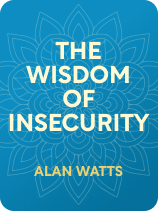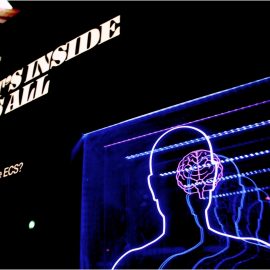

This article is an excerpt from the Shortform book guide to "The Wisdom of Insecurity" by Alan Watts. Shortform has the world's best summaries and analyses of books you should be reading.
Like this article? Sign up for a free trial here.
What’s the connection between anxiety and insecurity? Can you avoid being insecure?
According to The Wisdom of Insecurity by Alan Watts, insecurity is a fundamental quality of existence that causes anxiety. He explains that there’s no such thing as security because change is inevitable: One moment passes and is replaced by the next, which means nothing can be frozen in time.
Keep reading to understand how insecurity turns into anxiety.
Why Insecurity Makes You Anxious
Anxiety and insecurity are more closely related than you may think. Watts explains that every human has an animal self and a thinking self. Despite the fundamental insecurity of life, many people continue to hope or strive for security because they identify with their thinking selves over their animal selves. Your animal self has two key qualities: It has sophisticated instincts (for example, hunger cues), and it lives in the moment, always in flux—transitioning from hungry to satiated, for example, or from sleepy to alert, depending on the internal and external sensations it perceives. Your animal self doesn’t think, and it’s never concerned with the past or the future; it simply exists in the here and now and acts according to its internal wisdom rather than any abstract rules.
On the other hand, your thinking self is conscious—it’s able to contemplate, remember, and imagine. It also has time consciousness (a sense of continuity between the past, present, and future). Time consciousness makes you believe that you’re a stable, independent entity—since you share memories with your 10-year-old self, you believe you’re the same person you’ve always been. Your thinking self wants to continue being a stable, independent entity—so it resists change and tries to achieve permanence, even though it can’t.
Since your thinking self wants to become permanent, you become anxious about things that threaten your permanence—namely, painful experiences and death. But Watts explains that pain and death are both necessary and valuable parts of life. He says that pain must accompany pleasure because if you experienced a constant stream of pleasure, you’d eventually become numb to it—or it would hurt you, the way too much alcohol can turn you into an addict. Pain punctuates your experience to make pleasure meaningful and enjoyable. Watts argues similarly that death is a good thing—you’d get tired of living if you lived forever.
| Watts Versus Other Experts on the Self, Pain, and Death Like Watts, other experts argue that the human self is composed of multiple parts. For Watts, these are the animal and thinking selves; for psychologist Sigmund Freud, these are the id, ego, and superego. The id is the most essential part of yourself, since you’re born with it, and it’s like the animal self in that it’s motivated by instincts and is fixated on the present—for example, when the id feels sleepy, it drives you to go to sleep immediately (as opposed to waiting for a more socially acceptable time to sleep). The ego and superego are more like the thinking self—these parts of yourself take into account social norms and regulate your behavior accordingly (for example, by stopping you from falling asleep at work). They develop later (ages three to five). Although Watts attributes time consciousness to the thinking self, other experts argue that it’s more complex than that. Some research suggests that you’re born with an innate sense of time, which would mean that your id or animal self has at least a primitive form of time consciousness. Other research indicates that as you grow up and develop higher cognition (your thinking self or ego and superego), your sense of time matures. And while Watts says that like your animal self, animals aren’t concerned with time, other experts disagree: Some animals seem to remember the past and anticipate the future. This could mean that time consciousness isn’t a product of higher cognition, as Watts argues, but a basic animal instinct. Watts says that time consciousness makes your thinking self seek permanence, but research seems to suggest that both your animal self and non-human animals are also concerned with permanence. Humans and animals both have hardwired neurobiological survival instincts that cause them to behave in ways that prolong their lives and stave off death—like eating enough, for example. Additionally, when your survival is threatened, you suffer on a biological level, not just a cognitive level—your body automatically goes into a stress response (fight, flight, freeze, or fawn), and when that stress response is thwarted, you may develop post-traumatic stress disorder (PTSD), which has biological underpinnings. Watts also says that your thinking self’s desire for permanence gives you anxiety about the inevitability of pain and death. First, let’s address how pain threatens permanence—in humans, both physical pain and emotional pain can indicate and even exacerbate a threat to your health, which equates to a survival threat. As for whether anxiety is the product of your thinking self, some research suggests the opposite—animals (who ostensibly don’t have thinking selves) that witness violent death or endure extreme pain exhibit anxiety and PTSD-like symptoms, which indicates that on some level, they understand and want to avoid pain and death. While it seems that both animals and humans tend to avoid pain and death, some experts agree with Watts that pain and death make life meaningful: Psychologists note that painful experiences like conflict, loss, and emotional discomfort can help you figure out and prioritize your values. And as discussed earlier, the inevitability of death may motivate you to make the most of your life, as Camus argues in The Myth of Sisyphus. That doesn’t necessarily make pain or death less difficult to deal with—it just makes them valuable. |

———End of Preview———
Like what you just read? Read the rest of the world's best book summary and analysis of Alan Watts's "The Wisdom of Insecurity" at Shortform.
Here's what you'll find in our full The Wisdom of Insecurity summary:
- Philosopher Alan Watts's treatise on the origins and solutions to anxieties
- Why seeking security makes us anxious and how to accept insecurity
- How Eastern religions can help anxiety and Western ones make it worse






